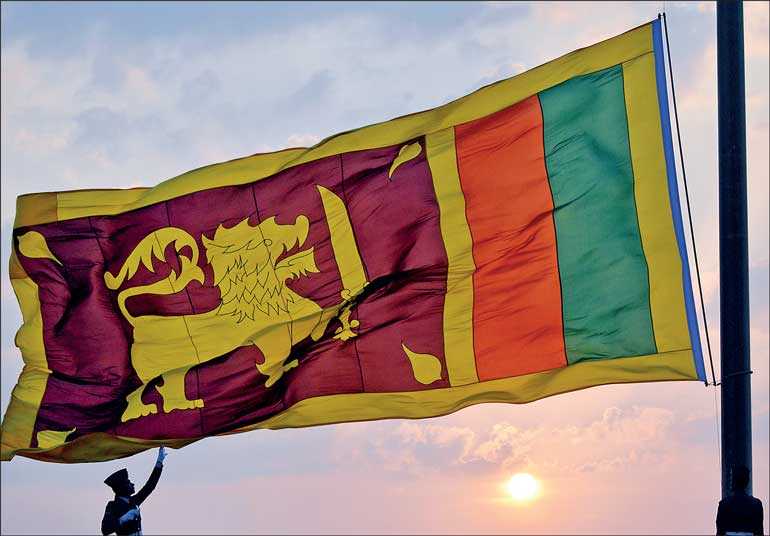Thursday Feb 26, 2026
Thursday Feb 26, 2026
Friday, 15 February 2019 00:00 - - {{hitsCtrl.values.hits}}

There is a report given by the expert panel appointed by the Steering Committee of the Constitutional Assembly in the form of a draft constitution. Based on this, the Steering Committee will have to prepare a draft constitution, if  they wish, to be discussed at the Constitutional Assembly. The description of the State is different in this document compared to the existing constitution and it is being debated at the public forums now.
they wish, to be discussed at the Constitutional Assembly. The description of the State is different in this document compared to the existing constitution and it is being debated at the public forums now.
In our Constitution Article 1 and 2 are as follows.
“Sri Lanka (Ceylon) is a Free, Sovereign, Independent and Democratic Socialist Republic and shall be known as the Democratic Socialist Republic of Sri Lanka.” “The Republic of Sri Lanka is a Unitary State.”
In the proposed report of the expert panel under the guidance of the Steering Committee the State is described as follows:
“Sri Lanka (Ceylon) is a free, sovereign and independent Republic which is an aekiya rajyaya/orumiththa nadu, consisting of the institutions of the Centre and of the Provinces which shall exercise power as laid down in the Constitution.”
In this article, aekiya rajyaya/orumiththa nadu means a State which is undivided and indivisible, and in which the power to amend the Constitution, or to repeal and replace the Constitution, shall remain with the Legislature and the People of Sri Lanka as provided in this Constitution.
The word “unitary” is removed and in the place of it two Sinhala and Tamil wards were inserted.
In the second paragraph the terms aekiya rajyaya, the Sinhala term, and orumiththa nadu, the Tamil term, were described and it was expressly stated that the State is undivided and indivisible. The word indivisible is not used in the existing Constitution to describe the State. In the French Constitution it was stated that the State was indivisible. It was also expressly stated that it is “aekiya” or “oru” since only Legislature and the people of Sri Lanka can amend the constitution or introduce a new one.
Oxford Dictionary defined the word unitary as follows:
“Relating to a system of government or organisation in which the powers of the constituent parts are vested in a central body – ‘a unitary rather than a federal state’”.
It defined the word federal as follows:“Having or relating to a system of government in which several states form a unity but remain independent in internal affairs – ‘a federal Europe’”.
In ‘Constitutional Law’ written by Patrick Monahan, Byron Shaw and Padraic Ryan, Unitary State is defined as follows:
“A state in which undivided sovereignty is conferred on the national (central) government, as distinguished from a federal or confederal system.”
M.A. Sumanthiran MP, a member of the steering committee, mentioned at a television debate that although the State is ‘aekiya’ the governance structure is having federal features so that the word unitary cannot be used to identify the Republic of Sri Lanka. The present governance structure based on the 13th Amendment to the Constitution is also having federal features. Jayampathi Wickramarathne, a member of the steering committee, said at a meeting held at the Lakshman Kadirgamar Center to discuss the proposed report of the expert panel of the new constitution that provincial councils were not given authority to change the Constitution and that power was given to the Center. After the approval of the Legislature it should be approved by the people of whole Sri Lanka and it is not necessary to consult the Provincial Councils in this respect
M.A. Sumanthiran MP, a member of the steering committee, mentioned at a television debate that although the State is ‘aekiya’ the governance structure is having federal features so that the word unitary cannot be used to identify the Republic of Sri Lanka. The present governance structure based on the 13th Amendment to the Constitution is also having federal features.
Jayampathi Wickramarathne, a member of the steering committee, said at a meeting held at the Lakshman Kadirgamar Center to discuss about the proposed report of the expert panel of the new constitution that provincial councils were not given authority to change the constitution and that power was given to the Center. After the approval of the Legislature it should be approved by the people of whole Sri Lanka and it is not necessary to consult the Provincial Councils in this respect.
Speaking in Sinhala he said, therefore, that the State is ‘aekiya’. He further said that in order to change the constitution, in the USA approval should be given by the provinces and in India approval should be given by the provinces to change certain articles only. Therefore USA is a federal state and India is a partial federal state.
In the constitutions of USA, India, France and South Africa it was not stated whether the constitutions were unitary or federal. If a constitution is unitary the Center should be able to take back the power, it has given to the provinces. That is the meaning of the word unitary defined by the Oxford Dictionary. According to the 13th Amendment to the Constitution it is not possible to take back certain powers vested in the provinces by the Central Government. Therefore even existing the Constitution is not unitary to its core.
According to the proposed report, the Legislature cannot enact laws for the subjects allocated to the provinces and if doing so it should be done with the concurrence of all the provinces. Otherwise a two-third majority should be obtained for the proposal either in the Parliament or in the Second chamber and thereafter it should be approved by the people at a referendum.
The Central Legislature by its own cannot take back the powers given to the provinces. Therefore the governance structure does not have unitary features. In order to take back the powers given to the provinces the Legislature should approve it with two-third majority and thereafter it should be ratified by the people as a whole. Therefore the State does not have federal features. The sovereignty of the people is not divided in this case. State is one unit – aekiya. In Tamil oru means one. In case if the central Legislature cannot enact laws at all without the approval of the provincial councils, then the sovereignty is divided.
Also according to the report if there is an amendment to the Constitution or to repeal and reintroduce a new constitution, Parliament and the Second Chamber should approve it with two-third majority and if the Constitutional Court opines it should be approved by the people at a referendum. Therefore sovereignty is not divided.
This means the State is not divided and not divisible. Governance structure is divided to a certain extent. Governance structure is within the State. Therefore divided governance structure is becoming undivided within the unit of the State under the condition of referendum.
The Fifth Article of the Constitution of the USA reads as follows: “The Congress, whenever two thirds of both Houses shall deem it necessary, shall propose Amendments to this Constitution, or, on the Application of the Legislatures of two thirds of the several States, shall call a Convention for proposing Amendments, which, in either Case, shall be valid to all Intents and Purposes, as part of this Constitution, when ratified by the Legislatures of three fourths of the several States, or by Conventions in three fourths thereof, as the one or the other Mode of Ratification may be proposed by the Congress…”
According to Article 368 of the Indian Constitution, amendments to certain articles of the constitution should be ratified by the Legislatures of not less than one-half of the States. Therefore sovereignty of USA is divided and the sovereignty of India is divided to a certain extent. Therefore in the proposed frame of the Constitution, it is not possible to use the word unitary to identify State since the word unitary deals with the governance structure as well although in constitutional law it coincides with undivided sovereignty. Sinhala word aekiya and Tamil word orumiththa nadu do not have the connotations the English word unitary is having. Hence it is correct to use those Sinhala and Tamil words rather than using the English word
According to Article 368 of the Indian Constitution, amendments to certain articles of the constitution should be ratified by the Legislatures of not less than one-half of the States. Therefore sovereignty of USA is divided and the sovereignty of India is divided to a certain extent.
Therefore in the proposed frame of the Constitution, it is not possible to use the word unitary to identify State since the word unitary deals with the governance structure as well although in constitutional law it coincides with undivided sovereignty. Sinhala word aekiya and Tamil word orumiththa nadu do not have the connotations the English word unitary is having. Hence it is correct to use those Sinhala and Tamil words rather than using the English word.
(The writer is a Chartered Accountant and holds a MBA offered by PIM of University of Sri Jayewardenepura)